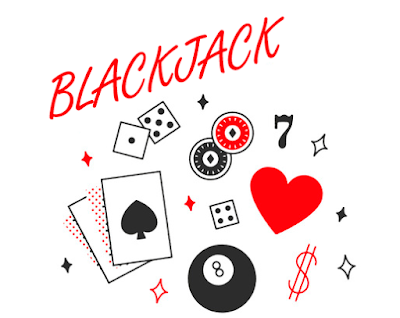Want to know when to hit a "soft" 17? Learn the rules and optimal strategy for blackjack online. Improve your chances of winning at blackjack by mastering the basics, and following advanced strategies before playing in one of the
blackjack casino for real money.
Blackjack Rules
The objective of blackjack is to get the total value of your cards as close to 21 as possible, while still beating the value of the dealer's hand.
All cards numbered 2-10 are worth the face value on the card. All "picture" cards (Jack, Queen, or King) are worth 10. All aces are worth either 1 or 11 at the player's discretion.
After the player makes his bet, the player receives two cards face up and the dealer receives two cards, one face up and one face down ("hole" card).
The player, upon looking at the value of his two cards and the value of the dealer's one card that is face up, has the option to take another card ("Hit") to try to get closer to 21, or leave the hand as it is ("Stay" or "Stand"). The player can "Hit" as many times as he/she wants and has the option to Stay after any "Hit." If the player hits and the value of his/her cards exceeds 21 the player "Bust," and loses their bet.
Once the player has made the decision to "Stand," the dealer then turns over the "hole" card.
If the dealer's hand total is between 17-21, the dealer must "Stand." If the dealer's hand is 16 or less, the dealer must keep hitting (taking cards) until either his hand is greater than 16 or the dealer "busts."
If the dealer "Busts," the player wins regardless of the value of his/her hand (pays 1:1 odds).
If the dealer "Stands" with a hand total between 17-21, the dealer's hand is compared to the players hand, and the higher total wins. If the player's hand and the dealer's hand are the same value, it is a tie ("Push")
A blackjack is an ace and any card valued at 10 (10, Jack, Queen, or King), which totals 21 (pays 3:2 odds). A blackjack always beats a 21 made up of 3 or more cards.
Additional Blackjack Betting Options and Actions
Double Down. The player is allowed to double his initial bet after seeing his first two cards, but only receives one more card after choosing to "double down."
Split. If the player is dealt two cards of identical values, the player has the option of splitting those cards into two separate hands. An additional bet equal to the initial bet must be made for the second hand. Now that the cards are split into two hands, the player receives one more card on the first of the split cards. The player now has the option to "Hit" or "Stand" on that hand. When the first hand is complete, the player receives a card on the second of the split hands and the player again has the option to "Hit" or "Stand." When splitting aces, the player will only receives one additional card on each of the split hands.
Insurance. When the dealer's face up card is an ace, the player has the option of making an additional insurance bet of up to one-half of the initial bet. If the dealer's hole card is any card with a value of 10 giving the dealer blackjack, the player's insurance bet wins (pays 2:1 odds).
Surrender. Some casinos may offer the player the ability to "Surrender" his hand. A "surrender" will give the player half of his bet back. However, if the dealer has blackjack, the entire bet is lost.
Blackjack Strategy
We all know that the House maintains an edge in the game of Blackjack. However, if you follow basic Blackjack strategy (shown below), the House edge falls below 1%.
On any given hand in Blackjack, as your initial play, the house will allow you to choose four courses of action (five, if "surrender" is allowed). These include "hit," "stand," "double down," and "split." To find the optimal play given your hand and the dealer's "up" card, locate the cell in the lookup table below.
| Your Hand | Dealer's Card |
|---|
| 2 | 3 | 4 | 5 | 6 | 7 | 8 | 9 | 10 | A |
| <=8 | HIT | HIT | HIT | HIT | HIT | HIT | HIT | HIT | HIT | HIT |
| 9 | HIT | DBL | DBL | DBL | DBL | HIT | HIT | HIT | HIT | HIT |
| 10 | DBL | DBL | DBL | DBL | DBL | DBL | DBL | DBL | HIT | HIT |
| 11 | DBL | DBL | DBL | DBL | DBL | DBL | DBL | DBL | DBL | HIT |
| 12 | HIT | HIT | STD | STD | STD | HIT | HIT | HIT | HIT | HIT |
| 13 | STD | STD | STD | STD | STD | HIT | HIT | HIT | HIT | HIT |
| 14 | STD | STD | STD | STD | STD | HIT | HIT | HIT | HIT | HIT |
| 15 | STD | STD | STD | STD | STD | HIT | HIT | HIT | HIT* | HIT |
| 16 | STD | STD | STD | STD | STD | HIT | HIT | HIT* | HIT* | HIT* |
| >=17 | STD | STD | STD | STD | STD | STD | STD | STD | STD | STD |
| A,2 | HIT | HIT | HIT | DBL | DBL | HIT | HIT | HIT | HIT | HIT |
| A,3 | HIT | HIT | HIT | DBL | DBL | HIT | HIT | HIT | HIT | HIT |
| A,4 | HIT | HIT | DBL | DBL | DBL | HIT | HIT | HIT | HIT | HIT |
| A,5 | HIT | HIT | DBL | DBL | DBL | HIT | HIT | HIT | HIT | HIT |
| A,6 | HIT | DBL | DBL | DBL | DBL | HIT | HIT | HIT | HIT | HIT |
| A,7 | STD | DBL | DBL | DBL | DBL | STD | STD | HIT | HIT | HIT |
| A,8 | STD | STD | STD | STD | STD | STD | STD | STD | STD | STD |
| A,9 | STD | STD | STD | STD | STD | STD | STD | STD | STD | STD |
| 2,2 | HIT** | HIT** | SPL | SPL | SPL | SPL | HIT | HIT | HIT | HIT |
| 3,3 | HIT** | HIT** | SPL | SPL | SPL | SPL | HIT | HIT | HIT | HIT |
| 4,4 | HIT | HIT | HIT | HIT** | HIT** | HIT | HIT | HIT | HIT | HIT |
| 5,5 | DBL | DBL | DBL | DBL | DBL | DBL | DBL | DBL | HIT | HIT |
| 6,6 | SPL** | SPL | SPL | SPL | SPL | HIT | HIT | HIT | HIT | HIT |
| 7,7 | SPL | SPL | SPL | SPL | SPL | SPL | HIT | HIT | HIT | HIT |
| 8,8 | SPL | SPL | SPL | SPL | SPL | SPL | SPL | SPL | SPL | SPL |
| 9,9 | SPL | SPL | SPL | SPL | SPL | STD | SPL | SPL | STD | STD |
| 10,10 | STD | STD | STD | STD | STD | STD | STD | STD | STD | STD |
| A,A | SPL | SPL | SPL | SPL | SPL | SPL | SPL | SPL | SPL | SPL |
HIT = "Hit"
STD = "Stand"
DBL = "Double Down"
SPL = "Split"
* = "Surrender," if available. Otherwise, "Hit"
** = "Split" if allowed to "Double Down" after a "Split." Otherwise, "Hit"
6 Most Asked Questions About Blackjack
- Can the game of blackjack be “beaten?”
Employing basic strategy provides the house with an edge of under 1%. Though many books have purported strategies where the game of blackjack can be beaten soundly, we’ve yet to see these strategies mathematically proven. That’s not to say that you can’t win money playing blackjack. We’ve seen streaks and entire shoes swing drastically in a player’s favor. However, mathematical simulation tells us that over time, using basic strategy, the house will have a slight edge.
Yes! But of course many casinos frown upon you doing so. Also, remember, you can’t count cards when playing online. However, playing online is a good opportunity to brush up on your card counting skills, as you’re are able to dictate the pace of play (you can play as slow as you’d like). Better listen to this episode
Legal Or Not, Card Counting Is Not Appreciated at Las Vegas Casinos
- Can I be kicked out of a casino for counting cards?
Yes and No. It depends on where you’re playing. Most Las Vegas casinos reserve the right to dismiss you from their property for any reason. Regardless of whether you’re counting cards, if you’ve won a lot of money, and the casino expects you of foul play, you may be getting a visit from the pit boss.
- Can a “bad” player sitting at the table affect the outcome of my hand?
No! For example, a player sitting at “third base” that routinely takes a hit on a “17” when the dealer’s showing a “6” will not adversely affect you hand over time. The “bad” player will help your hand as often hurting it. Read the hilarious
reddit thread about so-called bad players xD
- Is playing blackjack online different than playing at offline casino?
Yes and No. The rules of the game, strategies employed, and payouts are basically the same. However, the speed of play is determined by you and not the Blackjack dealer. Online play is great for practice and for novice players, as it provides ample time to think about your options. Also, as one might expect, when you play online there’s no breaks for shuffling, and no distractions from cocktail waitresses (though we’ve yet to determine if this is a good thing).
- How do I know that the cards being dealt in online blackjack are not fixed?
Most online casinos are audited by accounting firms who verify that the random number software are in fact producing random outcomes for cards and dice and also verify that claimed payouts are correct. Also, most online casinos use third parties to run simulations of all games in order to verify the randomness of the outcomes. The casinos will usually display their accreditations on their website to give players more comfort in their credibility.


